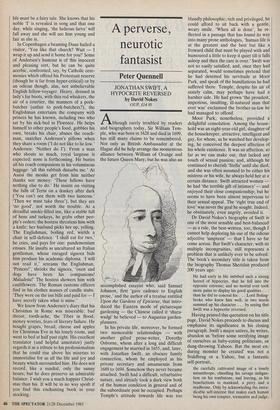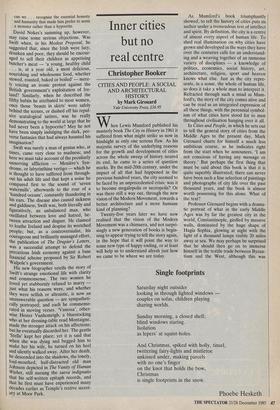A perverse,
neurotic fantasist
Peter Quennell
JONATHAN SWIFT, A HYPOCRITE REVERSED by David Nokes OUP, £14.95 Although rarely troubled by readers and biographers today, Sir William Tem- ple, who was born in 1628 and died in 1699, has still many claims to be remembered. Not only as British Ambassador at the Hague did he help arrange the momentous alliance between William of Orange and the future Queen Mary; but he was also an accomplished essayist who, said Samuel Johnson, first 'gave cadence to English prose,' and the author of a treatise entitled Upon the Gardens of Epicurus, that intro- duced the Eastern mode of picturesque gardening — the Chinese called it `shara- wadgi' he believed — to Augustan garden- planners.
In his private life, moreover, he formed two memorable relationships — with another gifted prose-writer, Dorothy Osborne, whom after a long and difficult engagement he married in 1655, and, later, with Jonathan Swift, an obscure family connection, whom he employed as his private secretary and amanuensis from 1689 to 1694. Somehow they never became attached. Swift had a difficult, rebarbative nature, and already took a dark view both of the human condition in general and of the subordinate post he occupied. Perhaps Temple's attitude towards life was too blandly philosophic; rich and privileged, he could afford to sit back with a gentle, weary smile. 'When all is done', he re- flected in a passage that has found its way into many prose anthologies, 'human life is at the greatest and the best but like a froward child that must be played with and humoured a little to keep it quiet till it falls asleep and then the care is over.' Swift was not so easily satisfied, and, once they had separated, would sometimes pretend that he had detested his servitude at Moor Park, and speak of the humiliations he had suffered there. Temple, despite his air of stately calm,. may perhaps have had a harsher side. He had grown 'the proudest, imperious, insulting, ill-natured man that ever was' exclaimed the brother-in-law he had managed to offend.
Moor Park, nonetheless, provided a delightful consolation. Among the house- hold was an eight-year-old girl, daughter of the housekeeper, attractive, intelligent and gay, for whom, as he watched her develop- ing, he conceived the deepest affection of his whole existience. It was an affection, so far as we can make out, that lacked any touch of sexual passion; and, although he continued to cherish 'Stella' until she died, and she was often assumed to be either his mistress or his wife, he always held her at a certain distance. Swift attracted women he had 'the terrible gift of intimacy' — and enjoyed their close companionship; but he seems to have been almost impervious to their sexual appeal. The 'right true end of love' was never the goal he sought. Indeed, he obstinately, even angrily, avoided it.
Dr David Nokes's biography of Swift is one of the most sensible and best-balanced — as a rule, the best-written, too, though I cannot help deploring his use of the odious adjective 'umpteen' — that I have so far come across. But Swift's character, with its multiple incongruities, still represents a problem that is unlikely ever to be solved. The book's secondary title is taken from the biography Thomas Sheridan produced 200 years ago:
He had early in life imbibed such a strong hatred of hypocrisy, that he fell into the opposite extreme; and no mortal ever took more pains to display his good qualities . . than he did to conceal his . . . Lord Boling- broke who knew him well, in two words summed up his character . . . by saying that Swift was a hypocrite reversed.
Having printed this quotation on his title page, David Nokes proceeds to discuss and emphasise its significance in his closing paragraph. Swift's major satires, he writes, abandon us 'before some terrifying image of ourselves as baby-eating politicians, or dung-throwing Yahoos. But the most en- during monster he created' was not a Stuldbrug or a Yahoo, but a fantastic self-portrait,
the carefully cultivated image of a lonely misanthrope, chiselling his savage indigna- tion on his tombstone, and leaving, as his benefactions to mankind, a privy and a madhouse. Only by acknowleding the inera- dicable self-interest that makes each human being his own tempter, tormentor and judge, can we . . . recognise the essential honesty and humanity that made him prefer to seem a monster rather than a hypocrite.
David Nokes's summing up, however, may raise some serious objections. Was Swift when, in his Modest Proposal, he suggested that, since the Irish were lazy, drunken and poor, they should be encour- aged to sell their children as appetising butcher's meat — 'a young, healthy child • • . is, at a year old, a most delicious, nourishing and wholesome food, whether stewed, roasted, baked or boiled' — mere- ly voicing an ironic protest against the British government's exploitation of Ire- land? Similarly, when he described the filthy habits he attributed to most women, once those 'beasts in skirts' were safely behind the scenes, or dashed off his repul- sive scatalogical satires, was he really demonstrating to the world at large that he had never been a hypocrite? May he not have been simply indulging the dark, per- verse fantasies that had always haunted his imagination?
Swift was surely a man of genius who, at times, came very close to madness; and here we must take account of the peculiarly unnerving affliction — Meniere's Syn- drome, or labyrinthine vertigo — which he is thought to have suffered from through- out his adult life and that kept a noise he compared first to the sound of 'seven watermills', afterwards to the roar of a `hundred oceans', constantly thundering in his ears. The disease also caused sickness and giddiness; Swift was, both literally and figuratively, an unbalanced man, who oscillated between love and hatred, be- tween attraction and disgust. He claimed to loathe Ireland and despise its wretched people; but, as a controversialist, his courageous and brilliantly managed effort, the publication of The Drapier's Letters, was a successful attempt to defend the precarious Irish economy against a base financial scheme proposed by Sir Robert Walpole's government. His new biographer retells the story of Swift's strange emotional life with clarity and commonsense. The two women he loved yet stubbornly refused to marry just what his reasons were, and whether they were selfish or altruistic, is now an unanswerable question — are sympatheti- cally portrayed; and each he commemo- rated in moving verses. 'Vanessa', other- wise Hester Vanhomrigh, a bluestocking who at her dressing-table read Montaigne, made the stronger attack on his affections; but he eventually discarded her. The gentle `Stella' kept her place; yet it is said that when she was dying and begged him to make her his wife, he turned on his heel and silently walked away. After her death, he descended into the shadows, the lonely, foul-mouthed, half-distracted old man Johnson depicted in The Vanity of Human Wishes, still nursing the saeva indignatio that his self-written epitaph records, and that he first must have experienced many decades earlier as Temple's restive secret- ary at Moor Park.



















































































 Previous page
Previous page